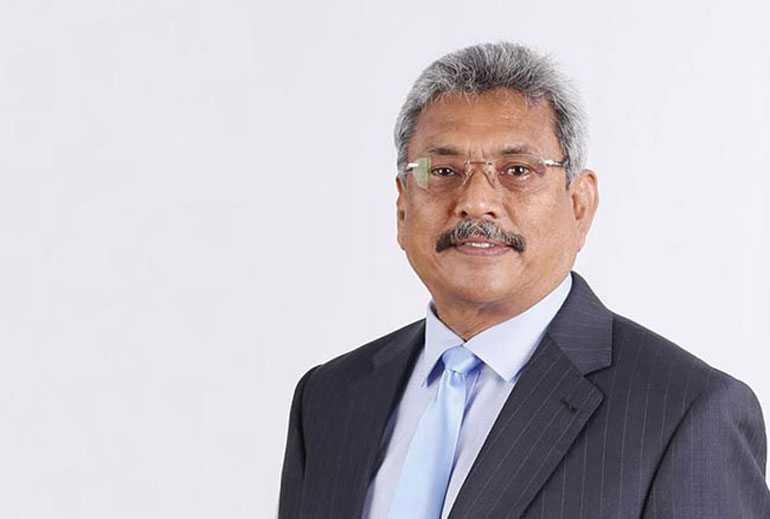Wednesday Feb 18, 2026
Wednesday Feb 18, 2026
Monday, 13 April 2020 17:40 - - {{hitsCtrl.values.hits}}

Gotabaya Rajapaksa
It is exactly one year since Muslim jihadists created an opportunity for GR to become the President of Sri Lanka. His political star was shining when COVID-19 broke out to test his mettle in managing a global disaster.
Up to the time of this composition, a total of 190 cases had been handled by health authorities, of which 134 had been identified active, 49 had recovered and seven died. However, according to reliable sources, these numbers are low, because of limited number of testing.
According to Dr. Wijewickrema of Infectious Diseases Hospital (IDH), there is capacity to test 1,500 per day, but so far only 500 have been carried out. He believes that testing should not be done “unnecessarily” and only “those who have been identified to undergo it compulsorily” are tested. How and where is this done are not clear. Every district in the country must have testing centres with adequately protected and trained health workers, and people should be constantly informed through all available channels to come forward and make use of those facilities. GR seems to be listening to his advisors more than medical experts.
From day one of GR’s presidency, he relied heavily on the support of the Army and Police forces to govern the country. He dispatched them to every district with the declared intention of utilising the forces in developmental work.
With the outbreak of COVID-19 however, their involvement in running the country has become much more substantial. That involvement is clearly manifested in the militarised management of COVID-19. Without district-wise testing facilities, GR has simply instructed the Army to impose total lockdown of areas suspected of having infected cases, and recurring island wide curfew to counter the spread of infection through human contact.
Difficulties people encounter through these lockdowns and curfews are too many and complaints and criticism are mounting about the way the Army and Police are handling the situation.
Unsurprisingly, the IGP has threatened to punish those who criticise their work and those who spread false information. In this militarised environment, it is doubtful whether people would be willing to come forward, to report cases of infection until the situation turns dire.
No doubt, it is the Rajapaksa clan, the Army and Police that are currently running the show with absolutely no input from the opposition and civil society groups. This is unfortunate given the dynamics of the pandemic and democratic parameters of the constitution. In short, COVID-19 militarised management has become a testing ground for a model of governance that has all the hallmarks of persisting with or without a General Election. COVID-19 management is a dress rehearsal for the final performance.
Meanwhile, the health and economic crises engendered by COVID-19 has also been compounded by a political crisis. GR, the Election Commissioner and members of the Caretaker Government are optimistic about holding the election either in late May or early June. They seem to think, contrary to expert world opinion that COVID-19 would lose its virulence and disappear by then, and normalcy would return. Even if it continues the devastation in the rest of the world, Sri Lankan rulers seem to believe that they would be uniquely successful in eradicating it. Good luck to them!
However, one cannot dismiss the fact that maintaining this optimism is politically advantageous to the rulers, and, it may be one of the reasons why they are limiting the number of tests, so that the total identified with the virus and number of recoveries may look minimal and less alarming.
This can turn out to be a delusion if people decide to remain secretive about their infection until it is too late, as that possibility was pointed out by one Muslim politician from the East at the last ruling party meeting. He was complaining about the cremation of Muslim bodies and requested the government to permit burials. One minster who was present at them meeting dismissed his request for exception, which provoked that member to counter the minister with a question that, what would the Government do if people conceal cases of infection. How does one know it is not happening now? Let the rulers be realistic about the situation and not use it for political advantage.
In the meantime, economic adversity is becoming increasingly acute. The country is running out of foreign reserves to finance imports, and the blanket ban on all imports shows the extent of desperation. It is hurting every sector of the economy, and the tourist sector is the worst affected. Ironically, the Central Bank, the gatekeeper of the country’s money supply, has appealed to Sri Lankans to bring home their hidden dollars from abroad without any questions asked – an exercise in legitimising the illegitimate with a dose of patriotism, thanks to COVID-19. GR also maintains that he would structure an economy appropriate to the country. One has to wait and see how he does it. With the Rajapaksa clan, Army and Police in total control of the country, its administration and economy, and with GR’s refusal to reconvene Parliament and his readiness to conduct the election at the earliest possible date, members of the ruling party are using every opportunity to convince the voting public that they are the saviours of the nation at this critical juncture.
The Election Commissioner’s warning against such dishonest canvassing will certainly be ignored. The COVID-19 environment with lockdowns and curfews prevents any opportunity for members of opposition to engage in political campaigning.
The other worrying scenario is the hate campaign against minorities, particularly against Muslims, by sections of the media. So far, there is no action by GR or the government to stop this abomination, because it is the same group of individuals and their establishments that lend support to the regime. In case the General Election is postponed indefinitely or held in a few months but fails to yield the expected victory with a two-third majority to SLNPS, there is a possibility that a mayhem against Muslims could be unleashed and a situation created for GR to declare emergency and continue with his militarised governance.
(The writer is attached to the School of Business and Governance, Murdoch University, Western Australia.)